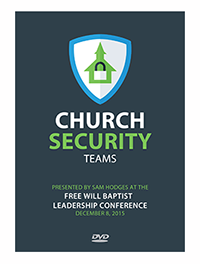
June-July 2016
Hidden Heroes
------------------
|






The Shepherd, the Flock...and the Wolves
Church Security
By Rob Conley
The concept of church security is unsettling to some. I get that. “The Lord will protect us,” they say. I agree completely. The challenge is that even when the Lord does something, He most often does it through us…frail, imperfect humans. So, let me start at the beginning…church security MUST be about ministry.
We want, even pray, for the vilest sinners to come to our churches. That is why we exist as a congregation. Every sinner needs the life-changing gospel of Jesus Christ. Our efforts in church security must be congruent with this primary focus on seeing the sinner gloriously saved.
Only when your church and security team have come to this realization should you begin to think about protecting the flock from the “wolves.” Church security is about creating and maintaining an environment where congregants are free to worship without distraction, and where sinners can hear the gospel presented without interruption.
Each church is unique. Every church should develop its own individual plan that flows out of the circumstances, gifts, and resources available to each congregation. Church security is designed to minimize risk and hopefully prevent safety issues from occurring, but it also includes a strong component of mitigating or minimizing liability after an incident has occurred. If we are prudent before something occurs, and do all we should as an incident occurs, liability will be reduced or even removed entirely.
As you form a church security plan, be mindful of local and state laws. Some states restrict personnel functioning in a security role to those properly licensed. Many states offer a security organization license a church can obtain, after which it becomes the “employer” of security officers. Check your local and state laws to make sure your plan complies.
Like any good plan, a security plan needs to be communicated and exercised. Once you have a plan, your security team and all relevant personnel need to practice the plan.
While your security plan needs to be church and personnel specific, most plans consider topics such as:
�
-
Health emergencies
�
-
Fire emergencies
-
�Weather emergencies
-
�Children’s areas, custody
issues, and prevention
of child abduction
-
�Evacuations
-
�Lock downs
-
�Active assailants
-
�Bomb threats
-
�Protestors
-
�The use of radios
-
�Using incident reports
-
�Property maps and building floor plans
-
�Special events
-
�Contact with media
-
�Securing leadership personnel
Most pastors don’t like to talk about the need for protection. Consider one simple perspective: the Church universal may not be dependent on one single individual, but ongoing ministry and Kingdom impact for our local church would be radically disrupted if our pastor were no longer able to minister. Protecting our pastor is not about him as an individual, but about the ongoing ministry of our church. Churches need a security plan!
In the next issue of ONE Magazine, security specialist Sam Hodges will introduce the basics of a good church security plan, from how to pick your members to training and practical steps. In the meantime, it might be time for your church to start the conversation by asking, “What would we do in case of an emergency?”
About the Writer: Rob Conley is director of financial operations for Free Will Baptist International Missions. He is also a private security specialist, with many years of experience in the field.

Church Security: Now on DVD
At the 2015 Free Will Baptist Leadership Conference, Free Will Baptist layman and security specialist Sam Hodges presented a one-hour security workshop for Free Will Baptist leadership. This training session is now available for your church or ministry at no charge (although $5 is requested to cover shipping).
Request your Church Security DVD
today:
|
|

